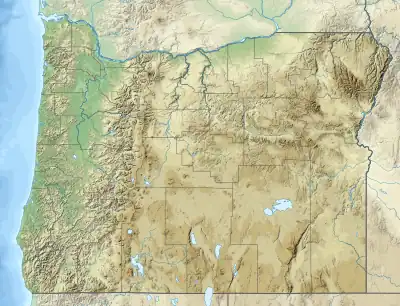West Fork Smith River
The West Fork Smith River is a tributary, about 10 miles (16 km) long, of the Smith River in Douglas County in the U.S. state of Oregon. It begins in the Central Oregon Coast Range near Roman Nose Mountain and flows generally south to meet the larger river 35 miles (56 km) from its confluence with the Umpqua River near Reedsport. The entire course of the river lies within the Siuslaw National Forest.[5]
| West Fork Smith River | |
|---|---|
 Location of the mouth of the West Fork Smith River in Oregon | |
| Etymology | Jedediah Smith, early 19th century explorer[1] |
| Location | |
| Country | United States |
| State | Oregon |
| County | Douglas |
| Physical characteristics | |
| Source | Central Oregon Coast Range |
| • location | near Roman Nose Mountain, Siuslaw National Forest |
| • coordinates | 43°55′09″N 123°43′19″W[2] |
| • elevation | 2,263 ft (690 m)[3] |
| Mouth | Smith River |
• location | River mile 35 (river km 56) along the Smith River |
• coordinates | 43°48′22″N 123°46′00″W[2] |
• elevation | 249 ft (76 m)[2] |
| Length | 10 mi (16 km)[4] |
The river supports populations of Chinook and coho salmon, steelhead, cutthroat trout, and lamprey.[6] Fishing in Oregon, a sportfishing guide, describes the river as "a beautiful wild trout stream".[4]
Degraded in past decades by logging, splash dams, and in-stream debris removal, the stream has been chosen for restoration.[6] Using grant money from the state, the Partnership for Umpqua Rivers has been placing thousands of boulders in the streambed to improve the spawning, rearing, and refugia habitat for fish. The project involves a 4.5-mile (7.2 km) stretch of the river.[6]
Tributaries
The named tributaries of the West Fork Smith River from source to mouth are Gold, Beaver, Moore, Crane, and Coon creeks.[5]
See also
References
- McArthur, Lewis A.; McArthur, Lewis L. (2003) [1928]. Oregon Geographic Names (7th ed.). Portland: Oregon Historical Society Press. pp. 889–90. ISBN 0-87595-277-1.
- "West Fork Smith River". Geographic Names Information System (GNIS). United States Geological Survey. November 28, 1980. Retrieved December 27, 2015.
- Source elevation derived from Google Earth search using GNIS source coordinates.
- Sheehan, Madelynne Diness (2005). Fishing in Oregon: The Complete Oregon Fishing Guide (10th ed.). Scappoose, Oregon: Flying Pencil Publications. p. 96. ISBN 0-916473-15-5.
- "United States Topographic Map". United States Geological Survey. Retrieved December 27, 2015 – via Acme Mapper. The map includes mile markers along the Smith River.
- "Oregon Fish Works" (PDF). Oregon Department of Fish and Wildlife. 2013. Retrieved December 28, 2015.